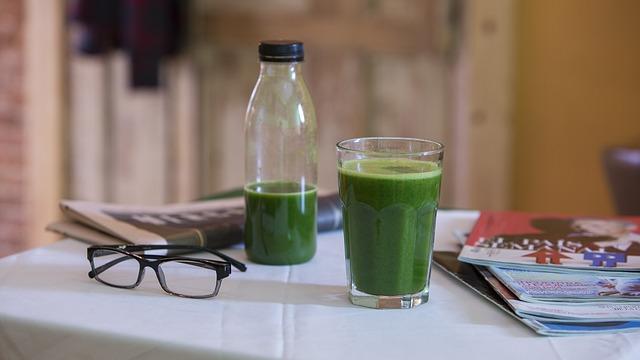In the world of fitness, the moments after a workout can often feel like a serene pause, a quiet interlude before the rhythm of daily life resumes. It’s during this time, when the echoes of exertion still resonate through tired muscles, that the true magic of recovery begins. Post-workout nutrition is not just a meal or a snack; it is a carefully crafted ritual, a bridge that transforms fatigue into rejuvenation. This article delves into the science and art of refueling your body, exploring what to eat for faster recovery and why it matters. Whether you’re a seasoned athlete or a fitness novice, understanding the role of post-exercise nourishment can elevate your performance and enhance your overall well-being. Join us as we unravel the secrets of optimal recovery, one delicious bite at a time.
Fueling Your Muscles: The Science Behind Recovery Nutrition
After an intense workout, your body is like a finely-tuned engine that’s just been pushed to its limits. It’s time to refuel and repair. The science of recovery nutrition focuses on replenishing glycogen stores, repairing muscle tissues, and reducing inflammation. Incorporating the right nutrients can significantly enhance your recovery process. Key players in this recovery game include carbohydrates, proteins, and healthy fats.
- Carbohydrates: Essential for replenishing glycogen stores, which are depleted during exercise. Opt for whole grains, fruits, and vegetables to get a mix of simple and complex carbs.
- Proteins: Crucial for muscle repair and growth. Include lean meats, dairy, or plant-based options like legumes and tofu to meet your protein needs.
- Healthy Fats: Important for reducing inflammation and supporting cell structure. Avocados, nuts, and seeds are excellent sources.
Combining these nutrients in a balanced post-workout meal can make all the difference. Consider a grilled chicken salad with mixed greens and quinoa, or a smoothie with spinach, banana, and a scoop of protein powder. By understanding the science behind recovery nutrition, you can optimize your post-exercise meals for faster recovery and better performance.
Protein Power: Essential Building Blocks for Muscle Repair
Protein is the cornerstone of muscle recovery, acting as the essential building blocks that our bodies need after an intense workout. It plays a crucial role in repairing muscle fibers that experience micro-tears during exercise, aiding in the recovery process and helping you come back stronger. Whether you’re a seasoned athlete or a casual gym-goer, incorporating protein-rich foods into your post-workout meal can significantly enhance your recovery.
Consider these protein-packed options to fuel your muscles:
- Lean Meats: Chicken breast and turkey are excellent sources of high-quality protein.
- Fish: Salmon and tuna not only provide protein but also essential omega-3 fatty acids.
- Plant-Based Proteins: Lentils, chickpeas, and quinoa offer protein along with fiber and other nutrients.
- Dairy: Greek yogurt and cottage cheese are rich in protein and perfect for a quick snack.
- Protein Shakes: A convenient option for those on the go, providing a quick protein boost.
By making protein a priority in your post-workout nutrition, you set the stage for optimal muscle repair and growth, ensuring you’re ready to tackle your next fitness challenge.

Carbs and Recovery: Replenishing Energy Stores Effectively
After a vigorous workout, your body’s glycogen stores are depleted and need replenishment for effective recovery and sustained energy. Consuming carbohydrates post-exercise is crucial as they play a vital role in restoring these energy reserves. Choose carbs that are easily digestible and quickly absorbed to ensure a swift recovery. Opt for whole grains, fruits, and starchy vegetables that offer a balanced combination of nutrients and natural sugars.
- Whole grains like brown rice, quinoa, or whole wheat bread provide fiber and essential nutrients that help in the gradual release of energy.
- Fruits such as bananas, berries, and apples are rich in vitamins and natural sugars that replenish glycogen levels efficiently.
- Starchy vegetables like sweet potatoes and corn are excellent sources of carbohydrates that also offer additional vitamins and minerals.
Integrating these carb sources into your post-workout meal not only aids in energy restoration but also supports muscle repair and overall recovery. Pair them with a source of protein to enhance muscle synthesis and recovery time.

Hydration and Micronutrients: The Unsung Heroes of Post-Workout Recovery
While protein and carbohydrates often steal the spotlight in recovery discussions, the role of hydration and micronutrients should not be underestimated. Proper hydration is crucial as it helps maintain the balance of electrolytes, which are vital for muscle function and nerve signaling. After an intense workout, your body craves not just water, but also essential minerals like sodium, potassium, and magnesium. Replenishing these through beverages like coconut water, or a homemade electrolyte drink can significantly aid recovery.
On the micronutrient front, think of vitamins and minerals as the subtle yet essential architects of your body’s repair mechanisms. Antioxidants such as vitamin C and E play a critical role in reducing inflammation and oxidative stress caused by exercise. Incorporate a rainbow of fruits and vegetables in your post-workout meals to ensure a diverse intake of these nutrients. Foods like sweet potatoes, spinach, and berries can deliver a powerful punch of micronutrients, enhancing your body’s ability to bounce back faster.
Concluding Remarks
As we wrap up our exploration into the world of post-workout nutrition, it’s clear that what you choose to refuel with can significantly influence your recovery journey. Whether you’re reaching for a protein-packed smoothie, a hearty bowl of quinoa and vegetables, or simply rehydrating with an electrolyte-rich drink, remember that each bite and sip plays a vital role in rebuilding and re-energizing your body. The path to faster recovery isn’t just about replenishing lost nutrients; it’s about understanding your body’s unique needs and responding with care and intention. As you step off the mat, out of the gym, or away from the track, let your nutritional choices reflect not only your fitness goals but also your commitment to overall well-being. Here’s to fueling your body wisely and recovering with purpose—one meal at a time.
